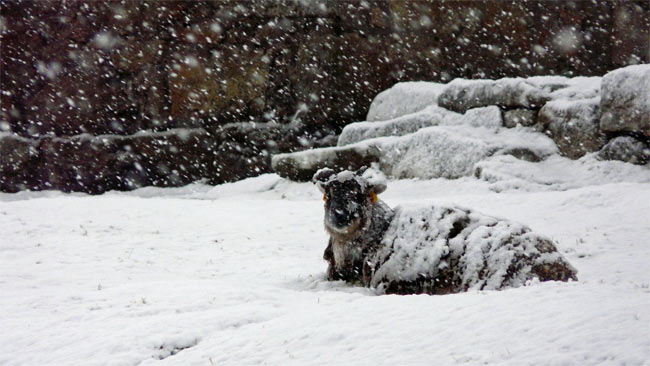How Soay Sheep Survive on Dreary Scottish Isles

Get the world’s most fascinating discoveries delivered straight to your inbox.
You are now subscribed
Your newsletter sign-up was successful
Want to add more newsletters?
Join the club
Get full access to premium articles, exclusive features and a growing list of member rewards.
On the Scottish archipelago of St. Kilda, the Soay sheep may not have any natural predators, but they do have the elements to contend with: a lack of food, brutal weather that can kill off half the population at a time and parasitic worms that live inside their bodies and suppress their immune systems.
Yet the sheep continue to survive, and scientists are finally beginning to understand why – the presence of sturdy immune systems in some sheep, and high reproductive rates in others have much to do with their endurance.
Some of the Soay sheep have high levels of antibodies inherited from their parents that help them to survive the parasitic worms and cold weather crashes. The downside: Sheep with such robust immune systems don't produce many offspring, said study researcher Andrea Graham, an evolutionary biologist at Princeton University in New Jersey and the University of Edinburgh in Scotland.
Enter the sheep with low levels of these immune-boosting antibodies. While these ewes more easily succumb to cold weather, they produce more offspring, Graham said. The odd finding explains why both the fit and the fertile sheep have yet to be weeded out by natural selection and are still present on the islands.
"The ewes with the strong antibody response can survive four or five crashes," Graham told LiveScience, but some of the ones with low amounts of antibodies "don't even live past the first one."
The sheep's reproductive cycles work in tandem with the basic laws of natural selection to allow their survival, she said.
According to natural selection, sheep that can't survive harsh winters and parasites should already be purged out. But because "they crank out loads of lambs, like twins every year they're alive, they end up with the same total descendants as the ones who skip breeding" every year, Graham said.
Get the world’s most fascinating discoveries delivered straight to your inbox.
Researchers have been studying these sheep for the past 26 years, with some researchers even living on the islands the majority of the year. The sheep are descendents of sheep that have been there since the Neolithic era, Graham said. Past research has suggested the Soay sheep are shrinking due to climate change.
Thousands of Soay continued to live on the islands after their human owners were evacuated by the Scottish government in the 1930s due to sickness and crop failures. Today, some military operations are housed on St. Kilda, and birdwatchers and tourists visit daily, she said.
Graham goes to the islands every August to collect blood samples from the sheep and measure their antibody levels. She said the findings suggest a deep evolutionary biological explanation for why people vary so much in the strength of their immune systems.
Though not yet established in humans, the relationship between immunity and reproductive rates in the sheep could help explain how human immune systems associate differently with survival and fertility, Graham said.
"It can help explain heterogeneity" in a human population, she said.
Next, Graham and her colleagues hope to understand the sheep's immunology better, and to see if an autoimmune response is the cause of death for the sheep with the high antibody levels.
The study is published today (Oct. 28) in the journal Science.
- Top 10 Working Animals
- 10 Amazing Things You Didn't Know About Animals
- Man's Other Best Friend: Shorn, Worn and Eaten for Dinner
Amanda Chan is a staff writer for MyHealthNewsDaily, a sister site to LiveScience.
 Live Science Plus
Live Science Plus











